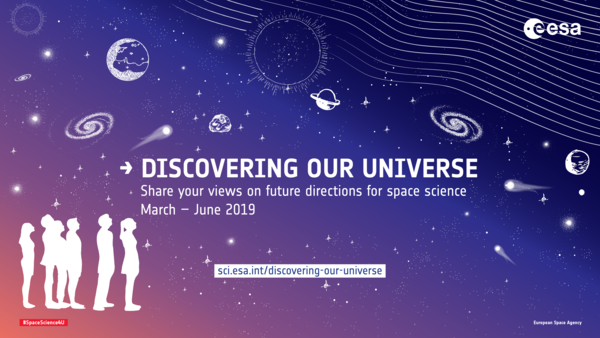Help shape ESA's space science programme
4 March 2019
How did our Milky Way galaxy form? How do black holes grow? What is the origin of our Solar System? Are there other worlds capable of hosting life? These are some of the questions our current science missions are designed to address. But what do you think are the most important questions that our future missions should tackle? Now is your chance to tell us. |
| Discovering Our Universe - Share your views. Credit: ESA |
Günther Hasinger, ESA Director of Science, is inviting the public to share their views on the questions that Voyage 2050, ESA's space science programme for the 2035–2050 time frame, should address. This public consultation opens today and will run until the end of June.
This is the first time that ESA invites the public to be involved in this process.
"Our missions are funded by the Member States, and that means their citizens," says Director Hasinger. "We wish to encourage a sense of ownership and involvement in the space science programme with our public, and so we want to hear everyone's views and choose our next set of missions in an open and transparent way."
The survey requires no expert knowledge about space science topics, and has been specially prepared to guide participants through a sequence of questions.
Every decade or so, ESA consults with Europe's science community to plan the future of its science programme. The current plan, Cosmic Vision 2015–2025, which covers a series of missions that will be launched and operated between now and the early 2030s, arose from a consultation with Europe's scientists that began in 2005. The Cosmic Vision missions will investigate profound questions about the nature and origin of our Solar System and the Universe as a whole.
Ground-breaking space science missions can take up to twenty years from concept through development and launch to producing science results. The pioneering Rosetta mission, which was launched in 2004 to rendezvous with Comet 67P/Churyumov-Gerasimenko and drop a lander on its surface in 2014, has its roots in the Horizon 2000 programme, an even earlier plan that was initiated in the 1980s.
Although it may seem far in the future, it is already time to start planning beyond the current horizon, for the decades up to 2050.
This forward-looking perspective is crucial for Europe, as it provides the confidence and common goals for the sustained collaborative efforts of scientists, engineers, industry and funding agencies over many decades. Long-term strategic planning also ensures the continued development of innovative technology while at the same time advancing Europe's research expertise across wide-ranging scientific fields.
"This consultation represents an exciting opportunity for European space science," says Director Hasinger. "We will be looking at what we can accomplish in the future, and that means we particularly encourage young people to share their views. After all, they are the ones who will work on and benefit from these missions."
More information
To take part in this public consultation, go to: sci.esa.int/discovering-our-universe/survey
Everyone over 16 years of age worldwide is invited to participate. There are no nationality restrictions.
As a thank you for taking part in the survey, participants can opt to be included in a monthly draw for a gift voucher throughout the duration of the public consultation.
More details about this public consultation: sci.esa.int/discovering-our-universe
A parallel consultation with Europe's scientific community to prepare for Voyage 2050 is currently underway: https://cosmos.esa.int/voyage-2050
For further information, please contact:
Luigi Colangeli
Head of the Science Coordination Office
Directorate of Science
European Space Agency
Email: luigi.colangeli![]() esa.int
esa.int
Fabio Favata
Head of the Strategy, Planning and Coordination Office
Directorate of Science
European Space Agency
Email: fabio.favata![]() esa.int
esa.int
Markus Bauer
ESA Science Programme Communication Officer
Tel: +31 71 565 6799
Mob: +31 61 594 3 954
Email: markus.bauer![]() esa.int
esa.int

